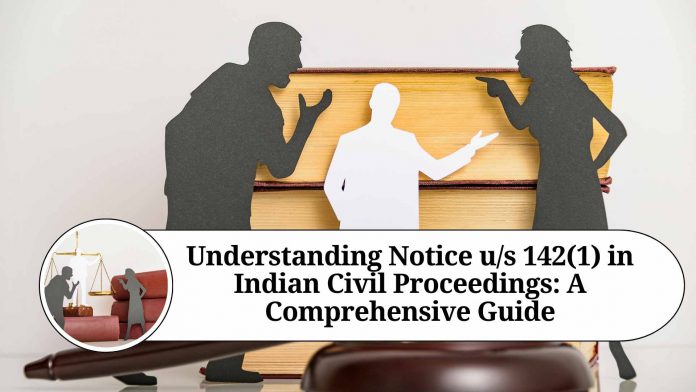Introduction:
In the realm of legal proceedings, notices play a crucial role in ensuring due process and providing parties with an opportunity to present their case. One such notice that holds significant importance in Indian law is a notice issued under Section 142(1) of the Code of Civil Procedure (CPC). This blog post aims to shed light on the nuances of this provision, its implications, and the significance it holds within the legal system.
What is Notice u/s 142(1)?
Section 142(1) of the CPC empowers courts to issue notices to parties involved in a civil suit or proceedings to ensure their appearance before the court. The notice u/s 142(1) acts as a formal communication from the court to the parties, informing them of the legal proceedings and the need to participate actively. It serves as an opportunity for the parties to present their case, submit relevant documents, and present arguments before the court.
Purpose and Implications:
The primary purpose of issuing a notice u/s 142(1) is to provide an equitable opportunity to both the plaintiff and the defendant to be heard. It ensures that the principles of natural justice are upheld, and no party is deprived of their right to present their side of the case. The notice gives the parties reasonable time to prepare their defense, gather evidence, and be fully prepared for the upcoming court proceedings.
Once a notice u/s 142(1) is served, the recipient is legally obligated to comply with it. Failure to respond to the notice may result in adverse consequences, such as the court proceeding ex-parte against the defaulting party or passing an order against them in their absence. It is crucial for the parties to take notice u/s 142(1) seriously and comply with its requirements to safeguard their interests.
Procedure for Issuing Notice u/s 142(1):
When a civil suit is filed before a court, the court examines the plaint or the application and, if satisfied with its contents, issues a notice under Section 142(1) to the defendants. The notice contains information about the case, the nature of the relief sought, and the date of the court hearing. The court sends the notice through registered post or any other recognized mode of service.
Upon receiving the notice, the defendant must acknowledge it promptly and comply with the court’s directions. The defendant should file a written statement within the prescribed time frame, present any evidence supporting their defense, and follow the court’s instructions throughout the legal proceedings.
Conclusion:
Notice u/s 142(1) is a crucial aspect of legal proceedings in India. It ensures that both the plaintiff and the defendant are given an equal opportunity to present their case before the court. Complying with the notice is vital to avoid adverse consequences, such as the court proceeding ex-parte or passing orders against the defaulting party. Parties involved in a civil suit or proceedings should take notice u/s 142(1) seriously and seek legal advice if needed to navigate the complex legal procedures effectively. By understanding and respecting the notice u/s 142(1), individuals can contribute to a fair and just legal system.
Read more useful content:
Frequently Asked Questions (FAQs)
Q1: What is the significance of notice u/s 142(1) in a civil suit?
A1: Notice u/s 142(1) ensures that both parties involved in a civil suit have an opportunity to present their case and defend their interests before the court.
Q2: How is notice u/s 142(1) issued to the parties?
A2: The court issues notice u/s 142(1) through registered post or any other recognized mode of service, providing the parties with information about the case and the court hearing date.
Q3: What happens if a party fails to respond to the notice u/s 142(1)?
A3: Failure to respond to the notice may lead to adverse consequences, such as the court proceeding ex-parte against the defaulting party or passing an order against them in their absence.
Q4: Can a notice u/s 142(1) be challenged or objected to?
A4: While it is possible to challenge or object to a notice u/s 142(1), it is generally advisable to seek legal advice to determine the appropriate course of action based on the specific circumstances of the case.
Q5: Is there a specific time frame for responding to the notice u/s 142(1)?
A5: The court specifies a time frame within which the defendant must file a written statement and comply with the court’s directions. It is crucial to adhere to this time frame to avoid any negative repercussions.
Q6: What should be included in the written statement filed in response to the notice u/s 142(1)?
A6: The written statement should contain the defendant’s response to the claims made by the plaintiff, including their version of the events, any defenses they wish to raise, and any supporting evidence.
Q7: Can a party request an extension for responding to the notice u/s 142(1)?
A7: In certain circumstances, the court may grant an extension for responding to the notice. However, it is essential to seek permission from the court and provide valid reasons for the requested extension.
Q8: What should a party do if they have not received a notice u/s 142(1)?
A8: If a party has not received a notice u/s 142(1), they should immediately inform the court and seek clarification to ensure that they are aware of the proceedings and can participate effectively.
Q9: Can a party represent themselves in the court proceedings after receiving a notice u/s 142(1)?
A9: Yes, a party can choose to represent themselves in court. However, it is often advisable to seek legal representation to ensure proper understanding of legal procedures and effective presentation of the case.
Q10: Can a notice u/s 142(1) be withdrawn by the court?
A10: Generally, once a notice u/s 142(1) has been issued, it cannot be withdrawn by the court. It is essential to comply with the notice and actively participate in the legal proceedings as directed.




















